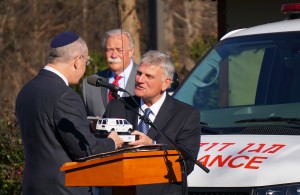 We invariably rely on first responders whenever lives or property are at risk. These uniformed personnel includes police officers, military officers, firefighters, security officers, rescue workers, correctional officers, 911 operators, and more.
We invariably rely on first responders whenever lives or property are at risk. These uniformed personnel includes police officers, military officers, firefighters, security officers, rescue workers, correctional officers, 911 operators, and more.
Because of the nature of their work, first responders have to deal with unusually stressful situations. Sometimes, lives are at stake. While they are trained for their jobs, a good number of them experience behavioral health issues like post-traumatic stress disorder (PTSD), depression, or substance abuse.
Breaking Point
Regular exposure to high-stress events like natural or human-made disasters, crimes, and medical emergencies put them in precarious situations that can take a toll on their psychological health. Whether they are directly or indirectly exposed to victims, being constantly immersed in this type of work environment can bring them to the edge and can cause them to break down if not properly addressed.
Where people run away from danger, they dive headfirst, risking life and limb. On top of everything, they are also subjected to long hours of work, changing work shifts, inadequate sleep, lack of time with family and friends, and physically challenging tasks.
When things become too overwhelming, they need professional help. However, because of the stigma that comes with mental health-related issues and their professional roles, many of them try to cope on their own. As a result, a first responder may try to self-medicate with alcohol, drugs, and other substances.
What Trauma Looks Like for First Responders
Post-traumatic stress disorder is a common behavioral health issue among first responders. Many first responders’ PTSDs are usually an accumulation of stress reactions over the years rather than a single triggering event. Often, their symptoms go unnoticed.
How can you tell if a first responder is suffering from this disorder? According to the Diagnostic and Statistical Manual of Mental Disorders, the symptoms include:
- Having nightmares, memories, triggers
- Avoiding memories and triggers
- Negative beliefs about one’s self and others
- Emotional numbing
- Detachment from others
- Loss of interest in things previously enjoyed
- Forgetting parts of a traumatic experience
- Irritability
- Excessive alertness
- Easily gets startled
- Reckless behavior
- Difficulty sleeping
Why Intervention Is Imperative
People who spend a lot of time around first responders should provide support by calling their attention to possible behavioral issues whether it’s PTSD, depression, an anxiety disorder, an eating disorder, or substance abuse.
This is imperative as intervention can prevent suicide attempts or a downward spiral due to depression and addiction. Professionals who have experienced a traumatic event are more likely to adopt self-destructive behaviors, especially if they’re subjected to another stressful occurrence without any intervention.
While their workplaces may provide intervention through counseling, first responders rehab treatment from experts can be the more effective route for recovery.
This program employs specific approaches that are specifically designed to address the amount of trauma first responders may have experienced.
Path To Recovery
First responders need to decompress and process cumulative trauma. Recovery often entails peeling away layers of symptoms and causes. A suitable intervention program can help heal their hurts and help them reintegrate with their families, work, and community.
Their roles in society are very important but at times, they are the ones who are in need of saving. It is our duty to respond to their needs as readily as they do for us whenever a crisis strikes.


